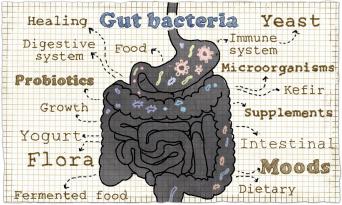
Neighborhood Nutrition: Believe It: The Gut Is Connected to the Brain


WHAT THE TEAM HAS IN STORE
APRIL: Learn why your relationship with your gut and your gut health is more important for your health and well-being than you may you realize. Workshops include how to make your own water kefir and gut health smoothies, in addition to exploring the gut and brain connection.
NEIGHBORHOOD NUTRITION TEAM OPEN HOURS AT WEAVERS WAY AMBLER:
- April 5, 1-3 p.m.
- April 9, 5-7 p.m.
- April 16, 2-5 p.m.
- April 26, 4-6 p.m.
WORKSHOPS
Visit www.weaversway.coop/events.
Our guts play a critical and somewhat complicated role in our bodies. Gut health is connected with weight, hormone balance, energy levels, chronic illness and much more. One area that is gaining greater attention in the medical and scientific community, is the role of the gut in brain function, often referred to as the gut-brain axis.
This “bidirectional” superhighway in our bodies links activities in our gut with a variety of brain activities, including cognitive function, motivation, mood and emotions. The central nervous system and enteric nervous system (the “gut brain”) are the key players in this axis, and they are in constant communication with one another through the vagus nerve, our gut-associated lymphatic tissue (GALT) and microbiome. While the biochemical processes are complex, it’s important to understand how imbalances in the gut-brain axis can manifest into health issues such as depression, anxiety and cognitive dysfunction.
According to the American Psychological Association, a 2017 analysis showed that 12.7 percent of Americans had taken antidepressants within the past month, with prevalence among women being twice as high as men. Johns Hopkins Medicine explains that the role of the enteric nervous system in mental health is significant, and while it was once thought that anxiety and depression caused gut issues, researchers are realizing that it may very well be the other way around. Research cited in the Annals of Gastroenterology in 2015 suggests that the microbiome may play an essential role in brain health by interacting directly with the central nervous system via several metabolic pathways.
One of the biggest disruptors of brain health may be dysbiosis, or an imbalance in gut bacteria. Variations in the microbiome can occur as early as during birth, when babies pass through the vaginal canal and come into contact with the mother’s vaginal microbiota. Children born via C-section bypass this vaginal inoculation and are considered to be at higher risk for imbalances in their gut flora. Animal studies have shown strong correlations between dysbiosis and depression/anxiety using antibiotics and probiotics to alter the bacterial balance.
Communication pathways discovered between the microbiome and the brain include production of neurotransmitters such as GABA and serotonin, changes in intestinal motility (how fast your food is moved through the gut), intestinal permeability (which can lead to leaky gut), inflammatory responses and immune function. Stress has a profound role on gut health and can alter every one of these pathways by activation of our hypothalamus - pituitary - adrenal (HPA) axis.
For those experiencing symptoms of depression, anxiety or cognitive dysfunction, looking toward gut health may offer some new insights for improved brain health. Common signs of gut imbalances include IBS, loose stool, gas, bloating, reflux, insatiety (always hungry), nausea, stomach pain, fullness, halitosis and belching. There is a wide range of interventions that can improve gut health, and some of the simplest steps can involve making a few changes to one’s diet. As a whole, our culture has become dependent on sweet and savory foods at the expense of more nourishing and gut-healing foods containing bitter and pungent flavors. Significantly reducing intake of sugar, alcohol and simple carbs while increasing bitter and pungent foods such as broccoli rabe, arugula, collards, cumin, celery seed and cayenne can begin shifting the gut in a healthier direction.
Dr. Wendy Romig, DCN, MS, CNS, LDN, is a Doctor of Clinical Nutrition practicing in the area of Functional Medicine, Nutrition and Clinical Herbalism. Wendy is owner of Sage Integrative Health Center in Mt. Airy, where she sees a wide range of complex, chronic health conditions. She is also a member of the Weavers Way Neighborhood Nutrition Team and Health and Wellness Committee.
